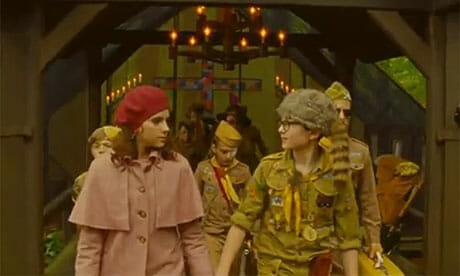Moonrise Kingdom

After seven features, a Wes Anderson production is unmistakable: white, upper-middle-class dysfunctional families deadpanning wry dialogue amid meticulous mise-en-scène to an eclectic soundtrack. Also: exquisite, often centered, shot compositions; uninterrupted lateral tracking camerawork through dollhouse-like sets; and inserts of quasi-obscure cultural objects. The auteur’s calculated quality persists in his latest film as well, but where his past work can come off as chilly and detached, Moonrise Kingdom exudes a warmth and innocence generated by the earnest adolescent romance at its core.
The year is 1965, and the sleepy New England island of New Penzance is stirred to action when Khaki Scout Sam Shakusky (Jared Gilman) and local resident Suzy Bishop (Kara Hayward) run away together. Sam is gone by the time we arrive, so all the expository characterization we learn is from what others say about him: His fellow Scouts dislike him, and his foster parents don’t want him back. By the time we catch up with him, he certainly looks the part of an “emotionally disturbed” orphan: slight of frame with heavy black glasses, a coonskin cap and a shadow on his upper lip, his uniform plastered with merit badges, both official and homemade. He’s a boy yet and can’t always get his mouth around Anderson’s signature wit.
But Sam is full of surprises: He’s a quite skilled outdoorsman, and when he reunites with the mod girl with whom he’s been exchanging letters for a year, he matter-of-factly hands her a bouquet of wildflowers and begins imparting survival tips. There’s no indication that he considers her out of his league, nor does he express any skepticism at what she’s brought along: a suitcase of stolen library books, a record player and a kitten. Likewise, Suzy is an unexpected rebel with a volatile streak that upsets the balance among her lawyer parents (Bill Murray and Frances McDormand) and three little brothers.